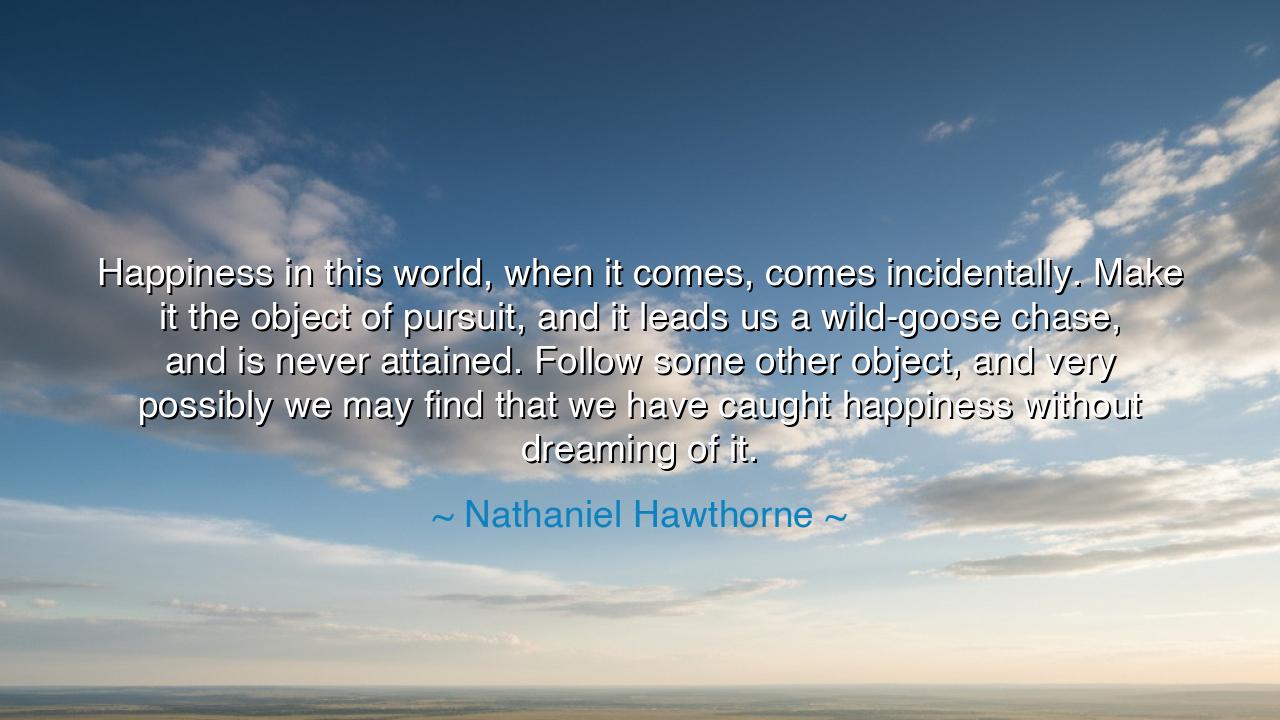
Happiness in this world, when it comes, comes incidentally. Make
Happiness in this world, when it comes, comes incidentally. Make it the object of pursuit, and it leads us a wild-goose chase, and is never attained. Follow some other object, and very possibly we may find that we have caught happiness without dreaming of it.






In the reflective words of Nathaniel Hawthorne, the chronicler of the human soul, we encounter a profound meditation on the nature of joy: “Happiness in this world, when it comes, comes incidentally. Make it the object of pursuit, and it leads us a wild-goose chase, and is never attained. Follow some other object, and very possibly we may find that we have caught happiness without dreaming of it.” These words remind us that happiness is not a prize to be seized, but a consequence of purposeful living. When sought directly, it evades us, but when approached indirectly, through meaningful engagement and commitment, it often arrives unbidden, like sunlight breaking through the clouds.
The origin of this insight lies in Hawthorne’s keen observation of life’s paradoxes and human desire. Living in 19th-century New England, he witnessed the relentless striving of men and women, the ceaseless yearning for wealth, recognition, and comfort. Through his novels and essays, he explored the illusion that happiness can be captured as an object, teaching that the more one pursues joy for its own sake, the more it slips through one’s grasp. Hawthorne’s wisdom is rooted in the recognition that purpose and virtue are the true paths, and that happiness is a byproduct, not a goal.
The meaning of this reflection is universal. Life is rich with tasks, duties, and pursuits that give shape to the soul. When we focus on ideals, work, service, creativity, or love, we direct our energy toward objects that have intrinsic value, rather than transient pleasure. In doing so, the soul becomes fully engaged, and happiness arrives naturally, often unnoticed. It is the incidental reward of living fully, of acting with integrity and devotion, rather than the result of grasping at joy itself.
History offers examples of this paradox in practice. Consider Florence Nightingale, who devoted her life to nursing and reforming medical care during the Crimean War. Nightingale did not seek happiness for its own sake; her pursuit was the alleviation of suffering and the establishment of order in chaos. Yet, in dedicating herself to this noble work, she found profound joy, satisfaction, and purpose — the happiness she did not chase directly but that emerged as a natural consequence of her dedication.
Even in ordinary life, Hawthorne’s wisdom is evident. A parent who nurtures children with love, a teacher who inspires without expectation of praise, or an artisan who crafts with devotion finds moments of joy in the process itself. The pursuit of mastery, service, and meaning often produces a happiness deeper and more enduring than the fleeting pleasure obtained from chasing it directly. When we allow joy to arise incidentally, it gains depth, richness, and permanence.
This teaching also warns against the danger of obsession with personal satisfaction. The wild-goose chase of direct pursuit leads to frustration, restlessness, and dissatisfaction, as happiness becomes a moving target, always just beyond reach. Hawthorne’s words remind us that the fulfillment of the soul is found in engagement with life’s meaningful work, in contribution and purpose, not in endless grasping at delight. Happiness is the shadow of virtue, the echo of engagement, and the reflection of a life well-lived.
The practical lesson is therefore both inspiring and humbling. Focus on work, service, love, creativity, and the cultivation of your character. Do not measure life by transient pleasure or the pursuit of joy as an end in itself. Let your energy be devoted to worthy goals and noble endeavors, and trust that happiness will arrive as a natural companion, unforeseen but deeply satisfying.
So, my child, carry Hawthorne’s wisdom into your daily life: pursue meaning, live with purpose, act with integrity, and love without reservation. Let joy be the silent gift that accompanies your labors, not the object of your chase. Happiness, when it comes incidentally, is richer, more resilient, and truer than the joy we attempt to seize, for it arises from the fullness of a life directed toward virtue and contribution, not from the empty chase of desire alone.






AAdministratorAdministrator
Welcome, honored guests. Please leave a comment, we will respond soon